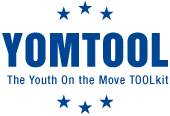| Access roles in YOMTOOL
Within the mobility life cycle context, there are four relevant partners interacting with each other during an exchange placement. It is possible to have three access roles at the same time in YOMTOOL. These are Competent Body, Sending Partner and Receiving Partner. The fourth role is held by the learner participants. The Competent Body has the role as the organising institution of the exchange placements, which as an umbrella organisation can be responsible for qualification definitions and awarding of certificates in multilateral relationships. The organisation can also operate bilaterally in mobility projects. The Competent Body is therefore responsible, together with another competent body (which is most likely based in another country), to set up the Memorandum of Understanding or the Partner Agreement. The Sending Partner is the organisation where the participant in a learning mobility placement comes from, the so-called “home institution”. Here the recognition of learning experiences from another setting takes place. A Learning Agreement regulates these procedures, which again can be set up in YOMTOOL by a sending partner. The Receiving (host) Partner in the exchange placement is the organisation where the participant will stay for a defined period. The MoU with the sending partner regulates this and defines which learning outcomes the participant is expected to acquire during the placement. All the previously mentioned institutions have the option to act as one, two or all of the roles in YOMTOOL. The learner participant can register and gather all its competences and qualifications in YOMTOOL in a well-structured manner. These competencies can then again be depicted in the Europass documents, and/or a personal transcript. These possibilities simplify and clarify how to best structure and present competences. Both the home and the host institution have access to the information about the learner participant, and are both responsible for documenting his or her competences. Within the context of YOMTOOL teachers and mentors have supporting and managerial roles in the context of a placement, also including assessments. Mentors and teachers have not separate access possibilities in YOMTOOL; however, they act in YOMTOOL through the roles of sending and receiving partners. |

